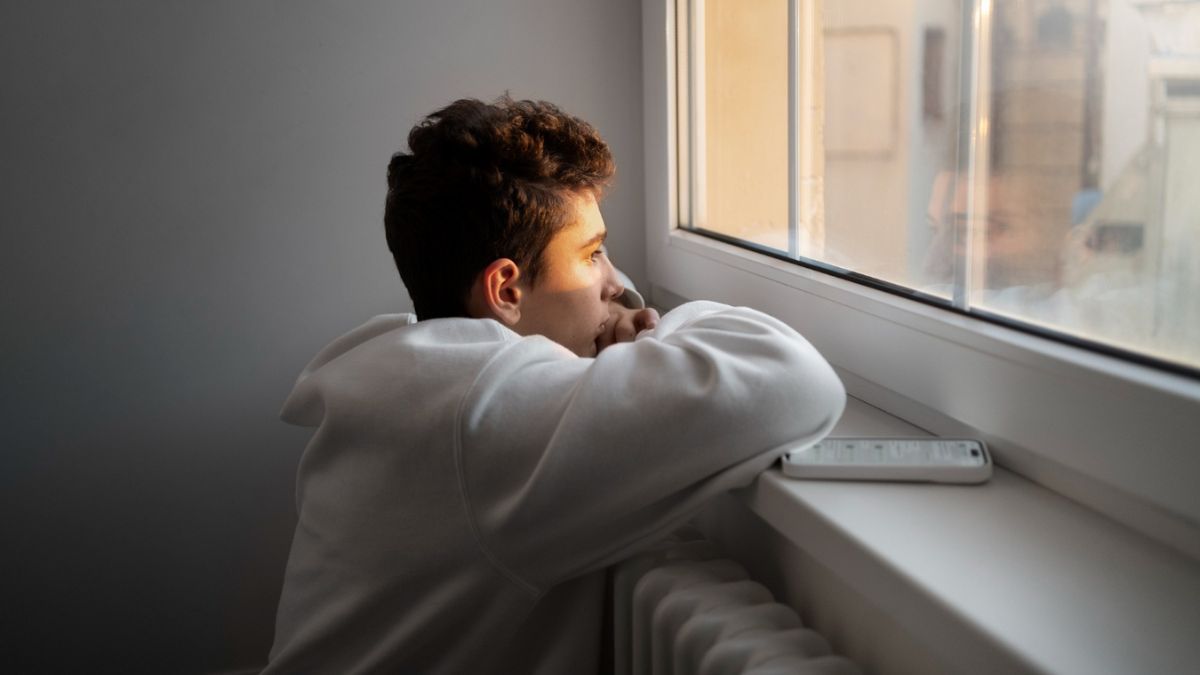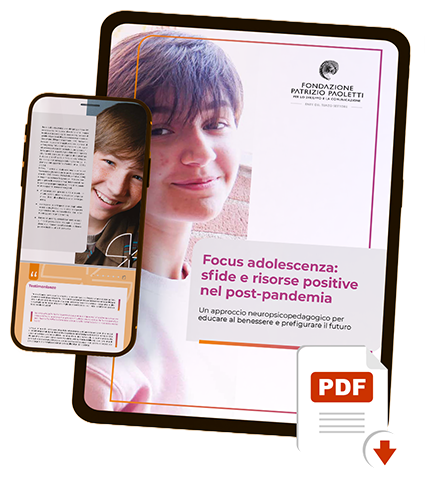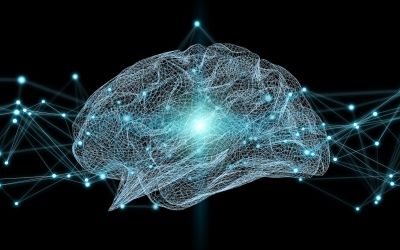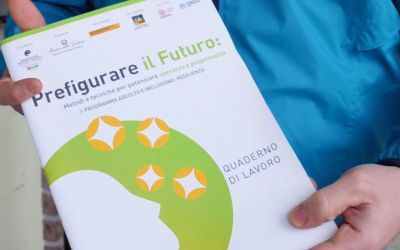
La crisi di salute mentale, il ruolo dell’educazione
Educare al mondo interiore per una salute consapevole
Il 7 aprile è la Giornata Mondiale della Salute, indetta dall’Organizzazione Mondiale della Sanità. Un’occasione per riflettere sui passi in avanti compiuti negli anni e sull’attuale crisi nella salute mentale, specialmente tra gli adolescenti. Fondazione Patrizio Paoletti, con all’attivo oltre venti anni di ricerca neuro-psicopedagogica e didatticaLa didattica non è semplicemente l’atto di insegnare, ma ... Leggi, partecipa alla sensibilizzazione sulla salute mentale, diffondendo l’importanza di due domande fondamentali: Come stai? Come stiamo? Il suo impegno dimostra come l’accento sul processo educativo costituisca la miglior strategia di prevenzione per il benessere mentale e una salute globaleQual è la definizione di salute proposta dall’OMS nel 194... Leggi.
La salute mentale degli adolescenti
Salute mentale: di cosa parliamo?
Qual è il ruolo dell’educazione nella promozione del benessere mentale?
L’approccio olistico di Fondazione Patrizio Paoletti
Pedagogia per il Terzo Millennio
Cosa ci impedisce di guardare al futuro con speranza?
Prefigurare il Futuro, per mantenere la mente vitale
I dati: stiamo vivendo una crisi globale della salute mentale
Nell’era post Covid, la scienza sta ancora valutando gli effetti sulla nostra mente di un’esperienza tanto complessa. Allo stesso tempo lo scoppio tensioni geopolitiche, la crisi socioeconomica e climatica hanno contribuito a un’emergenza psicologica su scala globale. In questo particolare contesto, i disturbi mentali sono aumentati del 28%, riferisce Emi Bondi, presidente della Società italiana di psichiatria.Secondo i dati statistici disponibili, i disturbi mentali sono cresciuti in modo esponenziale:
- 1 adolescente su 7 al mondo soffre di disturbi mentali
- nel mondo oltre 300 milioni di persone soffrono di ansiaL'ansia è una risposta emotiva caratterizzata da sentimenti... Leggi
- 300 milioni di persone al mondo soffrono di depressioneLa depressione è un disturbo caratterizzato da una tristezz... Leggi (in Italia 3,5 milioni)
- 80 milioni di persone soffrono di disturbo bipolareIl disturbo bipolare è un disturbo psichiatrico complesso c... Leggi
- 726.000 sono le persone che ogni anno si tolgono la vita.
Nell’AXA Mind Health Report 2024, emerge la sfida del binomio salute mentale e benessere lavorativo, con il 76% dei lavoratori italiani manifesta almeno un disturbo collegabile al lavoro, tra cui stanchezzaUn fenomeno dalle molte facce La stanchezza è un'esperienza... Leggi, perdita di energie e di interesse, disturbi del sonnoCos'è il sonno e perché è importante? Il sonno è uno sta... Leggi, stressCos’è lo stress? Dal punto di vista clinico, lo stress è... Leggi e ansia.
L’impatto economico della crisi della salute mentale è significativo: si stima che i costi legati a depressione, abbandono scolasticoPer ‘abbandono scolastico’ s’intende il fenomeno per c... Leggi e minore occupazione e produttività si aggirino attorno al 4% del PIL mondiale.
La salute mentale degli adolescenti
Preoccupa particolarmente la salute mentale degli adolescenti, con un aumento del 40% di fenomeni di autolesionismo, isolamento, abbandonoL’abbandono è una delle esperienze umane più intense e c... Leggi e disagio scolastico:- 2 adolescenti su 10 in Italia convivono con un disturbo mentale
- sono in costante aumento i ricoveri per casi di ansia e depressione presso i reparti di pronto soccorso psichiatrici (+25% Ospedale Bambin Gesù di Roma)
- il suicidio Attenzione! Le voci del Glossario di Fondazione Patrizio P... Leggi rappresenta oggi la seconda causa di morte per i giovani.
In occasione della Giornata mondiale della Salute Mentale 10 ottobre 2024, durante l’incontro “L’importanza del benessere mentale, per una Salute Globale”, Fondazione Patrizio Paoletti è stata invitata a presentare il suo Report sull’adolescenza e a condividere orizzonti di operatività e prevenzione, alla Camera dei Deputati. Tra le principali problematiche, segnalate dagli stessi adolescenti, ci sono:
- il peso della pressione scolastica e sociale (30%)
- la dipendenzaLa dipendenza psicologica è una condizione in cui una perso... Leggi dalle sostanze o dalla tecnologia (28%)
- l’ansia, la depressione e la bassa autostima (23%)
- il bullismo e il cyberbullismo (19%).
Scarica il report: scopri sfide e risorse positive nel post pandemia
"*" indica i campi obbligatori

FOCUS ADOLESCENZA
Salute mentale: di cosa parliamo?
La Dichiarazione Universale dei Diritti Umani definisce la salute mentale quale diritto umano fondamentale, essenziale per lo sviluppo individuale, comunitario e socioeconomico. Non si tratta solo dell’assenza di disturbi, ma di un continuum complesso che varia da persona a persona.L’Organizzazione Mondiale della Sanità definisce la salute mentale come uno stato di benessere psichico caratterizzato dalla capacità di:
- affrontare gli stress della vita
- utilizzare le proprie abilità in modo produttivo
- imparare e lavorare con efficacia
- contribuire alla comunità.
Conseguentemente, la salute mentale è alla base delle nostre capacità individuali e collettive di prendere decisioni, costruire relazioni, plasmare in definitiva il mondo in cui viviamo.
La nostra salute mentale dipende dalla complessa struttura del cervello che, pur offrendo enormi potenzialità, può anche essere vulnerabile a disfunzioni. Per questo motivo, è essenziale un’educazione adeguata che ci permetta di gestire al meglio questa complessità.
Qual è il ruolo dell’educazione nella promozione del benessere mentale?
Secondo l’Organizzazione Mondiale della Sanità, l’educazione è il più importante determinante sociale modificabile della salute.Non solo un’educazione di qualità offre migliori possibilità di avere buona salute in generale, allungando l’aspettativa di vita mediamente di 4 anni, ma fornisce basi solide anche per quelli che sono i principali fattori di protezione del benessere mentale:
- abitudini salutari
- connessioni sociali supportanti
- accesso ad un buon lavoro
- capacità di gestire le sfide che la vita presenta.
Questi fattori possono essere potenziati attraverso un’educazione efficace che sviluppi competenze fondamentali come:
- l’autoconsapevolezzaIl termine autoconsapevolezza si riferisce primariamente all... Leggi
- l’autoefficaciaDi fronte alle sfide quotidiane che dobbiamo affrontare, ogn... Leggi
- la capacità di apprendimentoIl termine apprendimento - con i sinonimi imparare, assimila... Leggi continuo (lifelong learningIl termine "Lifelong Learning", o apprendimento permanente, ... Leggi) e il problem-solving
- la resilienzaCosa si intende per resilienza? Secondo l'American Psycholog... Leggi.
Proprio le crisi attuali evidenziano quanto siamo impreparati ad affrontare le rapide trasformazioni della società e del mondo. Per costruire un futuro sostenibile, non basta trovare soluzioni tecnologiche o economiche: è necessario educare l’essere umano a gestire le proprie risorse interioriCosa sono le risorse interiori e perché sono fondamentali? ... Leggi,.
L’approccio olistico di Fondazione Patrizio Paoletti
Un team interdisciplinare di ricercatori nelle aree della psicologiaLa psicologia è la scienza che esplora la mente, le emozion... Leggi dello sviluppo, delle neuroscienzeIl cervello umano è una delle strutture più complesse e af... Leggi, dello sviluppo motorio, della scienza sportiva e della salute mentale, che comprende Tal D. Ben-Soussan direttrice dell’Istituto di Ricerca RINED di Fondazione Patrizio Paoletti, ha firmato una ricerca scientifica sulla necessità di un’educazione olistica come fattore di prevenzione per il benessere psicologico. L’articolo affronta il tema della mancanza di comprensione dell’interconnessione di molti aspetti critici dello sviluppo e dell’importanza di connettere intenzionalmente questi fattori per promuovere un approccio più olistico.La necessità di un simile approccio più olistico e inclusivo allo sviluppo del bambino e dell’adolescente – si sostiene nell’articolo – è sempre più evidente per promuovere la salute e il benessere a lungo termine. Le idee delineate nella corposa pubblicazione mirano a rispondere alla necessità di superare i confini disciplinari e delineare collegamenti sinergici tra più ambiti di ricerca che supportino lo sviluppo olistico, la salute globale e il benessere lungo tutto l’arco della vita.
Nella pubblicazione si propone un quadro concettuale che affronta in modo completo l’integrazione dei domini fisici, cognitivi, psicologici, sociali ed emotivi dello sviluppo del bambino e dell’adolescente, tenendo conto:
- della natura critica di un approccio sistemico relazionale allo sviluppo umano
- di una prospettiva contemporanea sui legami tra sviluppo cognitivo, sociale, emotivo, psicologico e fisico, sviluppo sociale, emotivo, psicologico e fisico,
- l’importanza critica dello sviluppo olistico che influenza le traiettorie di salute mentale a lungo termine e che inizia nella prima infanzia,
- un approccio pragmatico alla promozione dello sviluppo olistico utilizzando un’impostazione pedagogica detta MTSS multi-tiered system of support (sistema di supporto multi-livello).
Questo approccio all’educazione come strumento di protezione e sviluppo del benessere mentale, secondo Pedagogia per il Terzo MillennioPedagogia per il Terzo Millennio (PTM) è un metodo interdis... Leggi, per essere reso pienamente efficace, necessita di un coefficiente cruciale: la capacità di prefigurare un futuro sostenibile.
Pedagogia per il Terzo Millennio
La PedagogiaPer capire cos’è la pedagogia, diamo una definizione di q... Leggi per il Terzo Millennio, sviluppata da Patrizio Paoletti e dalla sua équipe a partire dalla ricerca neuro-psicopedagogica, nasce proprio per rispondere alle sfide educative del nostro tempo.Questo metodo considera l’essere umano in modo globale, integrando quattro dimensioni fondamentali:
- fisica (importanza del movimento per la cognizione)
- emotiva (sviluppo dell’intelligenza emotivaLa prima definizione di Intelligenza Emotiva in quanto tale ... Leggi)
- razionale (uso efficace delle risorse cognitive)
- aspirazionale (orientamento verso valori e obiettivi personali).
Occorre considerare questi diversi fattori per sviluppare stili di vita protettivi del benessere mentale in cui la resilienza sia allenata e potenziata. Tutte le parti che ci compongono, infatti, sono profondamente interconnesse ed è necessario considerarle nelle loro interazioni reciproche.
Fin dall’infanzia, gli individui hanno necessità di imparare a relazionarsi con il funzionamento del proprio corpo, scoprendo l’importanza del movimento per i processi cognitivi, ad esempio. Ma anche di conoscere la dimensione emotiva con la sua intelligenza e l’utilizzo efficace delle risorse cognitive.
La capacità di prefigurazioneLa prefigurazione, nella sua essenza psicologica, è la stra... Leggi del proprio futuro, basata sui propri valori più intimi, costituisce, infine, un preziosissimo fattore di orientamento per tutta la nostra vita.
Cosa ci impedisce di guardare al futuro con speranza?
Sono molti i dati relativi all’attuale crisi del benessere mentale tra gli adolescenti che indicano che l’elemento forse più debilitante in assoluto è la difficoltà di immaginare un futuro migliore.L’Eco-Anxiety, termine con cui si intende nella ricerca il generalizzato sentimento di frustrazioneLa frustrazione, dal punto di vista neuroscientifico e psico... Leggi delle nuove generazioni di fronte alla crisi climatica, è ben sintetizzato da questa citazione: “Quando il futuro di tutti gli esseri viventi è in pericolo, è difficile non sentirsi depressi”. Sono le parole di un partecipante ad un’indagine su 10.000 minori in 10 Paesi. Oltre il 50% dei partecipanti ha riportato sentimenti di tristezzaLa tristezza è un'emozione fondamentale che rappresenta una... Leggi, ansia, rabbiaLa rabbia rappresenta una delle emozioni primarie più poten... Leggi, impotenza e colpa rispetto alla crisi climatica in corso.
Il 73% dei giovani tra i 16 e i 24 anni del Regno Unito hanno dichiarato che la crisi climatica sta avendo un effetto negativo sulla loro salute mentale, in linea con le tendenze espresse dagli adolescenti di tutto il mondo.
Ulteriori ricerche condotte immediatamente dopo la pandemia da Covid19 mostrano come la difficoltà di prefigurare il futuro si correli con un decremento nella produzione di senso, specialmente tra gli studenti universitari, giovani che si trovano sulla soglia della vita adulta.
Uno studio post Covid19 condotto su 3.100 studenti universitari ha mostrato come la ricerca attiva di visione per il futuro si correla con l’attribuzione di maggior significato alla propria vita, che conduce ad arricchirsi maggiormente di ogni esperienza.
Sul versante opposto, è stato osservato come la mancanza di visione per il futuro si correli con i fenomeni di radicalizzazione violenta.
Prefigurare il Futuro, per mantenere la mente vitale
La ricerca neuroscientifica conferma l’importanza della prefigurazione come competenza. Prefigurare il futuro, infatti, è un’attività che il cervello svolge in modo diverso dal semplice sognare ad occhi aperti. Quando visualizziamo un futuro con l’intenzione di realizzarlo, si ha un’attivazione nelle aree correlate con: l’autoregolazione delle emozioniLe emozioni sono risposte psicofisiologiche complesse che ci... Leggi, l’utilizzo intenzionale delle memorie, la valutazione della conoscenza di sé stessi.Imparare a prefigurare il futuro è il fattore vivificante di tutte le competenze del benessere psicologico, che ci permette non solo di stare bene, ma anche di muoverci verso uno stato ancora migliore. Il benessere mentale, infatti, oggi più che mai, non può essere considerato in senso statico, ma sempre dinamico, di adattamento e miglioramento. Acquisire questa eccezionale competenza della nostra mente, che è prefigurare consapevolmente, può fare la differenza per la vita dei più giovani, come dei più grandi.
Lo sviluppo della capacità di prefigurazione si inserisce nella prospettiva di educazione alle Life Skills, abilità psicosociali dell’area personale, sociale, interpersonale, cognitiva e affettiva dell’individuo, che l’OMS ha confermato essere tecniche privilegiate per la promozione dell’Educazione alla Salute nell’ambito scolastico.
L’importanza dell’educazione socio-affettiva si fonda nella sua capacità di non concentrarsi su un tema specifico di prevenzione – si legge nel comunicato dell’ISS – bensì su una metodologia finalizzata ad incrementare le competenze di dialogo e comunicazione, di ascolto e relazione efficace in chi sta crescendo. L’educazione socio-affettiva prevede strategie e attività che possono essere portate anche molto precocemente all’interno del mondo della scuola.
Fondazione Patrizio Paoletti è impegnata da anni in programmi di formazione alle Life Skill, che sono integrate nella progettazione didatticaLa progettazione didattica è un processo chiave nell'ambito... Leggi della sua scuola AIS – Assisi International School, in cui si applica il Metodo Montessori e la Pedagogia per il Terzo Millennio. Le Life Skill sono allenate anche in Prefigurare il Futuro, programma psicopedagogico nato inizialmente per supportare le popolazioni colpite dal sisma del centro Italia del 2016 e che ha avuto un impatto talmente positivo da crescere costantemente e venire portato nelle scuole secondarie di tutta Italia, per diffondere metodi e strategie per la regolazione emotiva e l’autoconsapevolezza.
Fondazione Patrizio Paoletti è parallelamente attiva nella promozione di queste competenze in ambito europeo, con la partecipazione a progetti come EQ Students – Emotional Intelligence, the mind that feels, che mira aumentare la consapevolezza dell’intelligenza emotiva nelle scuole e nel mercato del lavoro.
- https://www.ospedalebambinogesu.it/giovani-malattie-mentali-consigli-genitori-esperti-167465/#:~:text=Nel%20mondo%20circa%201%20adolescente,Italia%20sono%20circa%202%20milioni.
- The OECD, Health at a Glance 2017: OECD Indicators Gap in life expectancy at age 30 between highest and lowest education level, by sex, 2015 (or nearest year), 2017.
Available from: www.oecd.org/health/health-systems/health-at-a-glance-19991312.htm - The foundations and opportunities outlined in our infographic were developed using Figure 6 of Robert Wood Johnson Foundation’s Education and Health report (2011).
- The healthy life expectancy figure is from a June 2017 report by the Office for National Statistics: An overview of lifestyles and wider characteristics linked to Healthy Life Expectancy in England.
- The AXA Study of Mind Health and Wellbeing in 2023, disponibile online all’indirizzo: https://www.axa.com/en/about-us/mind-health-report (consultato nell’aprile 2023)
- Stodden, D. F., Pesce, C., Zarrett, N., Tomporowski, P., Ben-Soussan, T. D., Brian, A., … & Weist, M. D. (2023). Holistic Functioning from a Developmental Perspective: A New Synthesis with a Focus on a Multi-tiered System Support Structure. Clinical Child and Family Psychology Review, 1-19.
- Hickman, C., Marks, E., Pihkala, P., Clayton, S., Lewandowski, R. E., Mayall, E. E., … & van Susteren, L. (2021). Climate anxiety in children and young people and their beliefs about government responses to climate change: a global survey. The Lancet Planetary Health, 5(12), e863-e873.
- Miconi, D., Levinsson, A., Frounfelker, R. L., Li, Z. Y., Oulhote, Y., & Rousseau, C. (2022). Cumulative and independent effects of experiences of social adversity on support for violent radicalization during the COVID-19 pandemic: the mediating role of depression. Social psychiatry and psychiatric epidemiology, 57(6), 1221-1233.
- D’Argembeau, A., Stawarczyk, D., Majerus, S., Collette, F., Van der Linden, M., Feyers, D., … & Salmon, E. (2010). The neural basis of personal goal processing when envisioning future events. Journal of cognitive neuroscience, 22(8), 1701-1713.
- https://www.ansa.it/canale_saluteebenessere/notizie/sanita/2025/03/28/disturbo-bipolare-altalena-dellumore-per-80-milioni-nel-mondo_96f2cba8-3d17-45bd-bdce-fc6e54927d84.html
- International Declatarion of Human Rights. https://www.ohchr.org/en/human-rights/universal-declaration/translations/italian (consultato nell’aprile 2023)
- Eco and climate anxiety. https://www.bacp.co.uk/about-therapy/what-therapy-can-help-with/eco-and-climate-anxiety/ (consultato nell’aprile 2023
- https://www.ansa.it/canale_saluteebenessere/notizie/sanita/2024/09/10/oms-ogni-anno-nel-mondo-726mila-suicidi-parlarne-previene_64257867-83df-419c-9969-80fa7f39a7db.html)
- https://blog.vicenzapsicologia.it/disturbo-bipolare/#Nuove_Statistiche_sul_Disturbo_Bipolare_2024
- https://www.gradenigo.it/news/si-puo-guarire-dallansia/#:~:text=Gli%20ultimi%20dati%20dicono%20che,colpisce%20pi%C3%B9%20persone%20al%20mondo.
- https://iris.who.int/bitstream/handle/10665/345301/9789240031029-eng.pdf?sequence=1)
- https://www.ilfattoquotidiano.it/2024/02/18/aumento-disturbi-mentali-ma-vanno-in-fumo-le-intese-per-alzare-i-fondi/7449455/
- https://psichiatria.it/fatto-quotidiano-in-3-anni-aumento-del-28-di-disturbi-mentali-vanno-in-fumo-le-intese-per-alzare-i-fondi/
- https://www.popsci.it/salute-mentale-unemergenza-silenziosa-e-sottostimata-ecco-limpegno-unanime-con-lagenda-2025.html
- https://corporate.axa.it/documents/715596/2905017/AXAItalia_CS_MindHealthReport2024_def.pdf/969016cb-5064-75c4-dfcf-7d4aea6188bc?t=1709729901417
- Foto di Freepik
Sii parte del cambiamento. Condividere responsabilmente contenuti è un gesto che significa sostenibilità
Alleniamo l'intelligenza emotiva: che emozione ti suscita questo articolo?
Potrebbe interessarti
Parole chiave
- Salute mentale
- crisi
- didattica
- salute globale
- ansia
- depressione
- disturbo bipolare
- stanchezza
- sonno
- stress
- abbandono scolastico
- abbandono
- suicidio
- dipendenza
- autoconsapevolezza
- autoefficacia
- apprendimento
- lifelong learning
- resilienza
- risorse interiori
- psicologia
- neuroscienze
- Pedagogia per il Terzo Millennio
- Pedagogia
- intelligenza emotiva
- prefigurazione
- frustrazione
- tristezza
- rabbia
- emozioni
- progettazione didattica
- autostima







